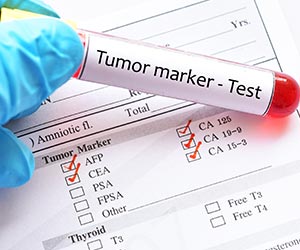Tumor Markers
The analysis of tumor markers may suggest the presence of cancer, helping medical oncologists to monitor therapy progression.

WHAT ARE TUMOR MARKERS?
Tumor markers alone are insufficient however, they are a beneficial tool when used in correlation with other tests for different types of cancers. While tumor markers can also be generated by normal cells and not only cancer cells, they can be produced at much higher levels during cancerous conditions. These tumor markers can be found in the cancer patient’s blood.
HOW ARE TUMOUR MARKERS USED IN CANCER PREVENTION?
Although an elevated level of tumor markers may suggest the presence of cancer, this piece of information alone is not enough to diagnose cancer. Hence, tumor marker results are always combined with other tests which may include: imaging procedures (MRI and mammogram) and biopsies. The combination of different tests helps reduce the risk of false negative or false positive results.
Tumor marker levels may be measured before, during and after patient treatment to help oncologists monitor therapy progression and efficacy.
The analysis of tumor markers is only recommended in cases where the individual has risk factors. This is due to the fact that many of these markers can be false negative by nature and false positive in numerous non-malignant behaviors or conditions such as smoking, bronchitis, pneumonia, cirrhosis and other infections. The most important function of tumor marker is to monitor cancer treatment response.